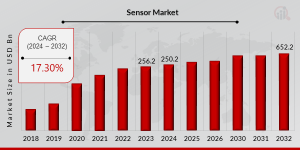Sensor Market to Skyrocket to $652.2 Billion by 2032 at 17.30% CAGR
Sensor Market Research Report Information By Type, Component, Technology, Verticals and Region
AL, UNITED STATES, August 5, 2025 /EINPresswire.com/ -- In an increasingly connected and automated world, the role of sensors has evolved from simple data collectors to the foundational building blocks of modern technology.These devices, which perceive physical inputs like light, heat, motion, and pressure and translate them into actionable data, are at the heart of the digital transformation. They are the essential link between the physical and digital realms, enabling a new era of intelligence, efficiency, and safety across a vast array of industries.
Market Overview and Projections
The global sensor market, a cornerstone of technological progress, was valued at a robust USD 256.2 billion in 2023. While experiencing a slight recalibration to USD 250.2 billion in 2024, a minor fluctuation often seen in dynamic markets, the long-term outlook is one of explosive growth.
The market is projected to reach an astounding USD 652.2 billion by 2032, propelled by a remarkable Compound Annual Growth Rate (CAGR) of 17.30% during the forecast period. This impressive growth trajectory signifies not just the increasing deployment of sensors but also a paradigm shift towards more sophisticated, integrated, and intelligent sensing solutions.
Download Sample Pages: https://www.marketresearchfuture.com/sample_request/4392
Key Drivers Propelling Market Growth
The massive expansion of the sensor market is underpinned by the accelerating adoption of sensor technology in three key application areas:
1. Internet of Things (IoT) Devices: The proliferation of IoT has transformed how we interact with our environments, and sensors are the primary enablers. From smart homes to smart cities and industrial automation, sensors are becoming more than just measuring tools. The latest trend is the rise of "smart sensors" that integrate on-chip processing and AI capabilities. These advanced devices can process data locally at the "edge," reducing reliance on cloud computing and enhancing real-time decision-making. Furthermore, advancements in ultra-low power consumption and energy harvesting are extending the battery life of IoT devices, making them viable for long-term, remote monitoring in smart grids and agricultural systems. The new Matter communication standard is also fostering interoperability, making it easier for sensors from different manufacturers to work together in a cohesive smart ecosystem.
2. Medical Equipment: The healthcare sector is undergoing a digital revolution, with sensors playing a pivotal role in diagnostics, remote patient monitoring, and surgical procedures. Wearable health monitors, for example, now use sophisticated sensors to track vital signs like heart rate, blood oxygen levels, and body temperature with clinical accuracy. The demand for non-invasive and continuous monitoring is driving innovation in flexible and miniaturized MEMS (Micro-Electro-Mechanical Systems) sensors, which can be integrated into smart patches and clothing. These advanced sensors, coupled with AI-driven analytics, are enabling early disease detection and providing a more proactive approach to health management, transforming the landscape of personal and clinical care.
3. Automotive Systems: The automotive industry is one of the largest consumers of sensor technology, particularly with the rapid evolution of Advanced Driver-Assistance Systems (ADAS) and the push towards autonomous vehicles. Modern vehicles are equipped with a complex network of sensors, including cameras, radar, and LiDAR, which work in tandem through a process known as sensor fusion to create a comprehensive real-time map of the vehicle's surroundings. This is essential for features like lane-keeping assist, adaptive cruise control, and automatic emergency braking. Furthermore, the electrification of vehicles has created a new demand for high-precision sensors, such as Hall-Effect and MEMS-based current sensors, which are critical for monitoring and controlling battery management systems to ensure safety and optimize efficiency.
Key Companies in the Sensor market include
• Robert Bosch GmbH (Germany)
• ABB Group (Switzerland)
• STMicroelectronics NV (Switzerland)
• Honeywell International Inc. (US)
• Siemens AG (Germany)
• Samsung Electronics Co. Ltd. (South Korea)
• Emerson Electric Co. (US)
• General Electric Company (US)
• OmniVision Technologies Inc. (US)
• International Sensor Technology (IST) (US)
• DENSO Corporation (Japan)
• Delphi Technologies PLC (Ireland)
• Texas Instruments Incorporated (US)
• Alphasense (UK)
• Ametek Inc. (US)
• OMRON Corporation (Japan)
• Figaro Engineering Inc. (Japan), among others
Browse In depth Market Research Report: https://www.marketresearchfuture.com/reports/sensor-market-4392
Regional Dominance and Competitive Landscape
The global sensor market is a truly international arena, with the Asia-Pacific (APAC) region historically holding a significant share. In 2021, APAC accounted for a substantial USD 87.69 billion of the market, a trend that has continued to be driven by its position as a global manufacturing hub for consumer electronics and automotive components. The region's robust industrial base and rapidly growing domestic markets for both vehicles and smart devices ensure it remains a key player in the market.
In this highly competitive environment, major industry players are focusing on aggressive R&D and strategic initiatives to secure their market positions. Companies are heavily investing in developing next-generation sensor technologies that are smaller, more accurate, and more energy-efficient.
A key trend is the consolidation of the market through strategic mergers and acquisitions, allowing companies to expand their technology portfolios and enter new application segments. Recent examples of this include strategic collaborations, such as Infineon Technologies' partnership with Swoboda to develop AI-ready current sensing modules for EVs, and product launches like TDK Corporation's new ultrasonic sensors designed for precise presence and proximity detection, demonstrating the relentless pace of innovation.
Procure Complete Research Report Now: https://www.marketresearchfuture.com/checkout?currency=one_user-USD&report_id=4392
Conclusion
The sensor market is an indispensable engine of technological progress. As the world becomes increasingly connected and intelligent, the demand for sophisticated and reliable sensing technology will only continue to accelerate. The impressive projected growth to USD 652.2 billion by 2032, driven by a powerful 17.30% CAGR, is a clear indicator of the market's foundational role in enabling the innovations of tomorrow.
From enhancing the safety of autonomous cars to revolutionizing healthcare and powering the smart ecosystems we rely on, sensors are not just a market—they are the senses of our future.
Norwalk’s 25 Van Zant Recognized as OBBBA-Compliant Facility for Industry
Emma Memma Makes Her Canadian Performance Debut with Live Appearances in Toronto and Edmonton
VSee Health, Inc. Receives Nasdaq Delisting Determination and Plans to Request Reconsideration
Więcej ważnych informacji
 Jedynka Newserii
Jedynka Newserii

 Jedynka Newserii
Jedynka Newserii

Handel

Mercosur to tylko wierzchołek góry lodowej. UE ma ponad 40 umów handlowych, które mogą destabilizować rynek rolny
Umowa handlowa między UE a krajami Mercosur może znacząco zaburzyć konkurencję na rynku rolnym i osłabić pozycję unijnych, w tym polskich, producentów – ostrzegają rolnicy i producenci żywności. Umowie sprzeciwia się część krajów unijnych, które domagają się klauzuli ochronnych oraz limitów importowych. – Problemem jest jednak nie tylko ta konkretna umowa. Chodzi o cały system wolnego handlu, który się kumuluje z dziesiątek innych porozumień – podkreśla Andrzej Gantner, wiceprezes Polskiej Federacji Producentów Żywności.
Firma
Dzięki zdalnej weryfikacji tożsamości z wykorzystaniem AI firmy zminimalizowały liczbę oszustw. Rozwiązania wykorzystuje głównie sektor finansowy

Z najnowszych danych Eurostatu wynika, że w 2024 roku 5,9 proc. polskich firm korzystało z rozwiązań z zakresu sztucznej inteligencji. W 2023 roku był to odsetek na poziomie 3,67 proc. Wciąż jednak jest to wynik poniżej średniej unijnej, która wyniosła 13,48 proc. Jednym z obszarów, który cieszy się coraz większym zainteresowaniem wśród przedsiębiorców, jest weryfikacja tożsamości przez AI, zwłaszcza w takich branżach jak bankowość, ubezpieczenia czy turystyka. Jej zastosowanie ma na celu głównie przeciwdziałać oszustwom i spełniać wymogi regulacyjne.
Prawo
Daniel Obajtek: Własne wydobycie i operacyjne magazyny to filary bezpieczeństwa. Zgoda na magazyny gazu poza krajem to rezygnacja z suwerenności energetycznej

Były prezes Orlenu ostrzega przed zmianami w ustawie o zapasach ropy naftowej, produktów naftowych i gazu ziemnego. Jego zdaniem przygotowana przez rząd nowelizacja tzw. ustawy magazynowej i ujednolicanie unijnej polityki energetycznej to zagrożenie dla bezpieczeństwa energetycznego Polski. W jego opinii tylko silna spółka narodowa, własne wydobycie, krajowe magazyny i zbilansowany miks energetyczny zapewnią Polsce bezpieczeństwo i konkurencyjność.
Partner serwisu
Szkolenia

Akademia Newserii
Akademia Newserii to projekt, w ramach którego najlepsi polscy dziennikarze biznesowi, giełdowi oraz lifestylowi, a także szkoleniowcy z wieloletnim doświadczeniem dzielą się swoją wiedzą nt. pracy z mediami.





![Nestlé w Polsce podsumowuje wpływ na krajową gospodarkę. Firma wygenerowała 0,6 proc. polskiego PKB [DEPESZA]](https://www.newseria.pl/files/1097841585/fabryka-nesquik_1,w_85,r_png,_small.png)



.gif)

 |
| |
| |
|